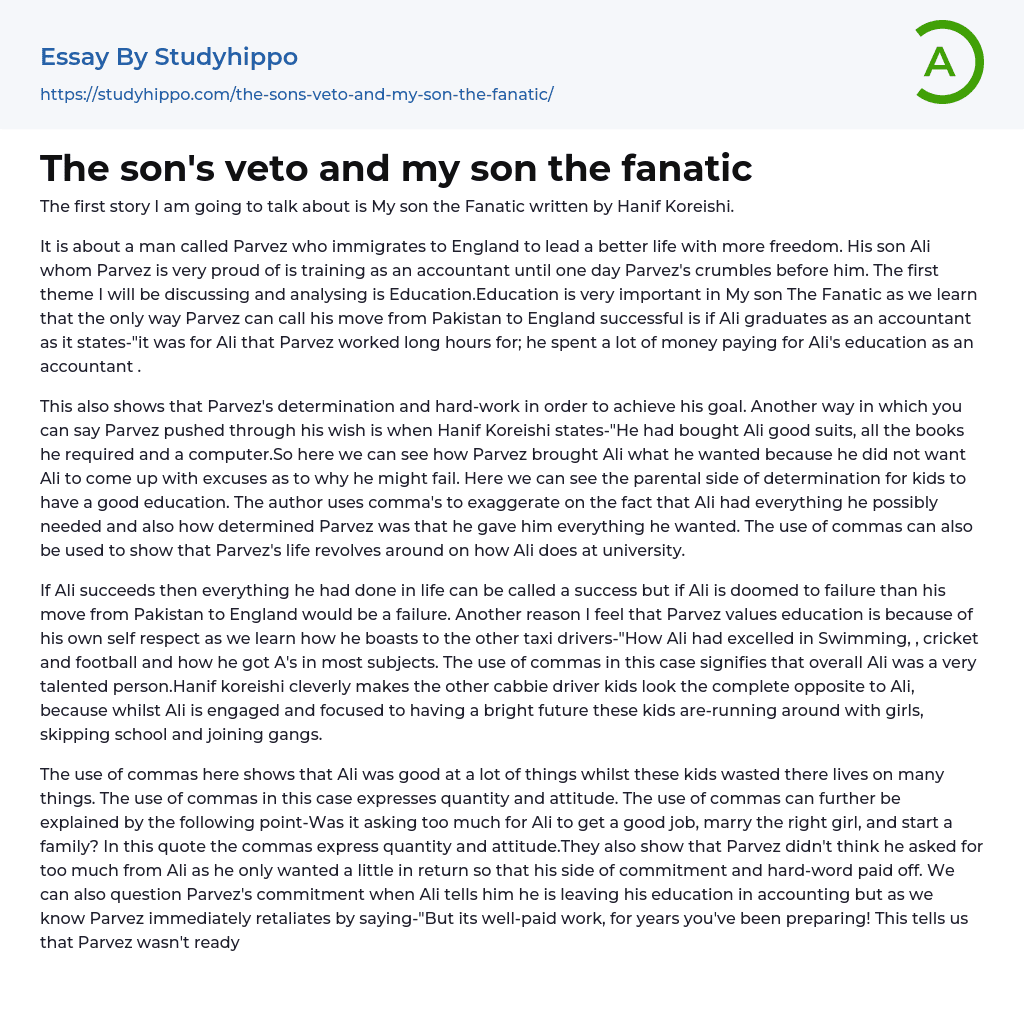The topic of discussion is "My Son the Fanatic" authored by Hanif Koreishi.
My Son the Fanatic is the story of Parvez, who immigrates to England for a better life with more freedom. His son Ali is training to become an accountant, which makes Parvez very proud. However, one day Parvez's world falls apart when Ali becomes radicalized. The importance of education is a significant theme in the story. We learn that the only way for Parvez to consider his move to England successful is if Ali graduates as an accountant. Parvez worked long hours and spent a lot of money on Ali's education for this reason.
This passage illustrates Parvez's unwavering commitment and hard work to achieve his goals, exemplified by his efforts to support his son Ali's education. Hanif Koreishi highlights Parvez's dedication by stating that he provided Ali with quality clothin
...g, essential books, and a computer to ensure Ali's success. Parvez's support stems from his parental desire to ensure his child receives a worthwhile education. The author emphasizes the abundance of resources provided to Ali, as well as Parvez's unwavering determination for his son's success with the use of commas. Ultimately, it is clear that Parvez prioritizes Ali's academic achievement above anything else in his life.
The success of Ali determines the success of everything in his life. Moving from Pakistan to England will only be considered successful if Ali succeeds, otherwise it will be a failure. Parvez, the taxi driver, values education because it boosts his self-respect. He boasts about Ali's achievements in swimming, cricket, football, and most subjects with the use of commas suggesting that Ali was a talented person. Contrastingly, other cabbi
driver kids are portrayed as the opposite of Ali by Hanif Koreishi as they run around with girls, skip school and join gangs instead of focusing on their bright future like Ali.
The use of commas in this passage conveys Ali's proficiency in various skills, in contrast to the aimless pursuits of his peers. Additionally, the commas illustrate both quantity and attitude, as exemplified by the rhetorical question: "Was it asking too much for Ali to get a good job, marry the right girl, and start a family?" Parvez's expectations for Ali are seen as reasonable and modest. However, when Ali announces his decision to leave his accounting studies, Parvez responds with an exclamation: "But it's well-paid work, for years you've been preparing!" This not only indicates Parvez's frustration but also reveals his lack of acceptance towards Ali's choice to pursue a different path.
The text discusses two themes in Hanif Koreishi's My Son the Fanatic. The first theme involves the build-up of anger from the current situation to the end of the story. The second theme is the characters' backgrounds, with Ali being born in Britain and Parvez in Pakistan, as indicated by the statement "Parvez was brought up in Lahore." Despite being from a country with religious values, Parvez sees education as important in life, stating "Was it asking too much for Ali to get a good job, marry the right girl, and start a family?" This desire for education may be rooted in Parvez's own wishes for himself, as it may not have been possible for him in Pakistan.
Parvez desires for his son to marry the appropriate girl, fearing that he may have
been coerced by his parents into a marriage. He hopes that Ali can experience what he could not in Pakistan, a nation plagued by poverty that potentially altered his own childhood. Parvez's desperation for Ali to have a successful life and a strong foundation stems from this. The intersection of religion and background is another pertinent theme in My Son the Fanatic because they are intertwined. The individual's upbringing often impacts their religious beliefs.
Parvez's upbringing in Pakistan lacked freedom, leading him to seek refuge in England where he appreciates the liberty to do almost anything. This sheds light on his possible motives for immigrating to England. Additionally, the book suggests that Parvez's departure from religion can be linked to a negative experience he had at mosque.
- Where Are You Going Where Have You Been essays
- Adoption essays
- Aunt essays
- Babies essays
- Bedroom essays
- Caring essays
- Children essays
- Daughter essays
- Divorce essays
- Dog essays
- Dysfunctional Family essays
- Family Tradition essays
- Family Values essays
- Father essays
- Foster Care essays
- Friends essays
- Grandparent essays
- Home essays
- Hometown essays
- Husband essays
- Jealousy essays
- Love essays
- Marriage essays
- Mother essays
- Online Dating essays
- Parenting essays
- Parenting Teens essays
- Parents essays
- Relationship essays
- Room essays
- Sibling essays
- Sister essays
- Wedding essays
- Wife essays
- Allegory essays
- Alliteration essays
- Comedy essays
- Comic book essays
- Drama essays
- Dystopia essays
- Fairy Tale essays
- Fantasy essays
- Fiction essays
- Ghost essays
- Gothic Fiction essays
- Gothic Literature essays
- Irony essays
- Legend essays
- Memoir essays
- Novel essays




